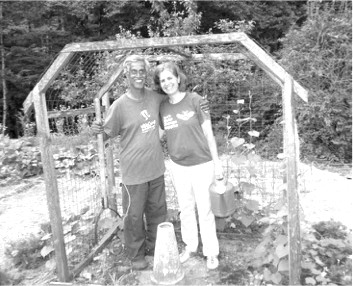by Merwyn DeMello
 My wife, Kirstin and I, returned to the US in March, after a six-year span of service with Mennonite Central Committee in Afghanistan and Bangladesh. We then embarked upon a pilgrimage, seekers of intentional community in which to live and love with over the next years.
My wife, Kirstin and I, returned to the US in March, after a six-year span of service with Mennonite Central Committee in Afghanistan and Bangladesh. We then embarked upon a pilgrimage, seekers of intentional community in which to live and love with over the next years.
Agape Community was the first stop on this journey, one that is traveled in tumultuous times, when the air and the mind are dominated and suffocated by the Covid-19 virus, and when misguided political leadership drives a wedge of divisiveness. Agape became our oasis allowing for healing and nourishment of body, soul, and spirit.
Brayton Shanley’s book, The Many Sides of Peace and the recent co-authored memoir, Loving Life on the Margins, by Brayton and Suzanne, as well as issues of the Agape Community journal, Servant Song, became our compass point for insight into the history and life of the community.
After several years of humanitarian service in countries impacted by US policy and action stemming from the immorality of its military-industrial complex, I was eager to learn from and experience how a community in the USA offers a radical model of action and resistance charted by a deliberate choice for lived non-violence, subsistence off the land, and contemplative prayer.
I quickly immersed myself into the rhythm at Agape. I realized that the emphasis of living in harmony with nature meant that all acts of labor whether outdoors or indoors are an extension of the sacred. Early morning prayer with Taizé chant sets the tone. We performed as ora et labora, the daily rigors of outdoor work — weeding, scything, building woodpiles, picking raspberries – and the indoor work – shared tasks of processing greens, cooking, and cleaning. This did not preclude healthy debate, exchange of opinions on a variety of topics, sharing life-experiences and exotic recipes.
On the few occasions Kirstin and I ventured out of our oasis, it was to bask in the sunshine by the waters of the Quabbin Reservoir, connect with friends of Agape, and to participate in the Black Lives Matter vigil in the nearby town of Ware. In interpersonal interactions during the vigil, I could feel a peaceful energy from our group, derived from contemplative practice at Agape. Also, in this spirit, the vigil’s non-violent protest became for me, an authentic manifestation of Ahimsa, or non-injury in Sanskrit.
A night spent in the Hermitage, led me down the path of reflection and reminiscence. I recalled years spent in Bangladesh where I was wondrously struck by how peoples’ lives are intrinsically linked to each other and to nature. The ushering in of each season, the multiple auspicious religious festivals, and even auspicious days in the socio-political calendar are celebrated by people across the faith spectrum with the sharing of food, song, and dance.
The Bengali poet-philosopher Gurudev Rabindranath Tagore describes the mystical connection when life or physical existence is in harmony with the cycles of nature.
Necessity seems to be the only thing in nature for which everything moves and works; the bud becomes the flower, the flower becomes the fruit, the fruit becomes the seed, the seed becomes a new plant and so it goes; the chain of activity goes on without interruption. When, through the mental and physical barriers that we erect, we bluntly separate ourselves from the inexhaustible life of nature, when we become just a person, and no longer ‘person in the universe’, then we create fearful problems – and when the fount of their solution has run dry, we essay all sorts of artificial processes, each of which brings with it a rich harvest of interminable difficulties.
So, for that magical span of two weeks at Agape Community, I could live in harmony with the rhythms of nature. As the sun set on each day, I felt a deep sense of peace, that the Holy, God, resides everywhere and in all things.
How important it is then, to constantly remind myself that no matter where I am, I endeavor to live in harmony with the cycles of nature. It is by recognizing the abundance and wellness to be found in the relationship with nature that one can break out of the violence of the destructive cycles of accumulation and production.
A rich blessing for all of us at Agape to share Merwyn and Kirstin’s lives from Afghanistan to Bangladesh and India as we built community together. Thank you both.
